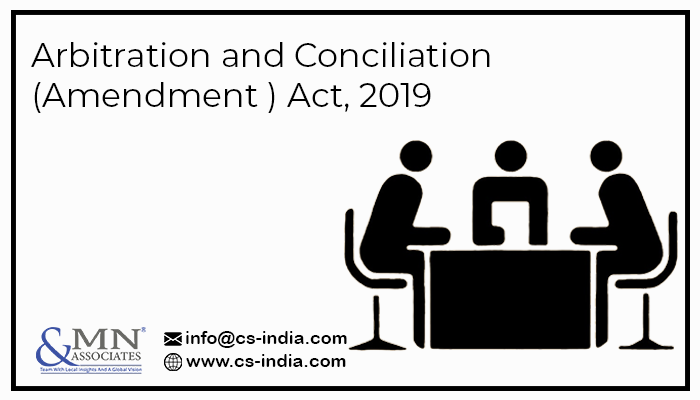
Arbitration and Conciliation (Amendment ) Act, 2019
The Amendments in Arbitration Act, 2019 passed in Lok Sabha on 1st August 2019 brings out provisions to deal with domestic and international arbitration and defines the law and procedures to bring in effectiveness in conciliation proceedings.
Arbitration is a form of dispute resolution mechanism wherein disputes are handled and solved privately by individuals as arbitrators with the mutual agreement of parties, without resorting to judicial intervention. Due to limits placed in procedures and actions, the Act was much awaited to be reframed with revised amendments which finally came into light in 2019. The amendments proposed since 2015, has now received the assent of both the houses of Parliament on the Arbitration and Conciliation Act, 2019.
Salient Features
The features of the Arbitration and Conciliation Act, 2019 are as follows:
- Previously in case of disagreement between parties, arbitrators were appointed by the parties with mutual consent of the parties can request Supreme Court or High Court or any third person or institution to hire an arbitrator. With the amendments in the Act bill, The Supreme Court and High Court have been given a responsibility to set up arbitration institutions for the appointment of arbitrators. For international arbitration, appointment powers to such institutions shall be provided by the Supreme Court and for domestic, the High court shall take the initiative. In case, there are no arbitration institutions setups, the Chief Justice of the concerned High court will maintain a panel of arbitrators to hold arbitrations.
- For the appointment of arbitrators, an application shall have to be disposed of within 30 days.
- The bill seeks for establishing the Arbitration Council of India (ACI), an independent body for handling arbitration, mediation, conciliation and dispute redressal mechanism, rules and procedures. The function and responsibility of the ACI are :
a) Building policies for gradual arbitration and appointing accrediting arbitrators.
b) Maintaining uniform standards and alternate dispute redressal methods for prompt resolving cases.
- The Act clearly defines the composition of members of the Arbitration Council (ACI) as :
a) Judge of Supreme Court or Judge of High Court or Chief Justice of High Court or Person competent for arbitration as Chairperson.
b) the eminent arbitration practitioner;
c) an academician with experience in the arbitration; and.
d) government appointees.
- The Amendment puts a relaxation on the time restrictions placed for domestic and international arbitrations and directs to dispose of arbitration proceedings within a period of 12 months.
- The Amendment places a restriction on the time taken to file written submissions and the defense to the claim before an arbitral tribunal. The amendment now requires the written claims in an arbitration proceeding should be completed within 6 months.
- The Amendment in Act seeks to keep confidential details of arbitral proceedings except for details required in certain circumstances. Disclosures shall be made only when necessary or while enforcing the award.
Also Read: Consumer Mediation Cells to Resolve revamp Disputes under Consumer Protection Act, 2019
To Conclude :
The purpose of the Act is to keep pace in Arbitration and Conciliation matters, without leaving it to delays with courts and for speedier delivery of resolutions. In short, the amendment in the Act concerns with keeping judicial intervention at a very negligible level.
Want to hire a guiding expert for your business?
Get one by emailing us at info@cs-india.com
